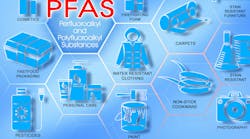An independent comparison of three major surface aerators has shown the Aqua Turbo® unit, from Aquaturbo Systems Inc., to be more efficient in oxygen transfer and to have lower maintenance needs.
The study, conducted by independent engineering firm GSEE Inc. of La Vergne, Tenn., for a major paper manufacturer compared three floating aerator manufacturers' standard 75 hp, 1200 rpm models. The Aquaturbo Systems unit, using a patented screw centrifugal impeller that does not require a diffusion head or deflector plate, was tested against two units that did require a fixed (non-rotating) diffusion head, one with a screw impeller and the other using a marine-type impeller.
Triplicate tests were performed on each manufacturer's aerator in a 50' x 50' x 12'2" basin. Oxygen transfer was determined via procedures described in ASCE's "A Standard for the Measurement of Oxygen Transfer in Clean Water." The Aquaturbo unit outperformed the closest competitor by approximately 10 percent, as measured by each unit's standard aerator efficiency rating.
Dave Gibson, general manager for AquaTurbo, said the system also offers a lower spray pattern, providing for minimized aerosol release.
For municipal wastewater treatment applications, the units are suited for lagoon systems, sequencing batch reactors, aerobic digesters, and activated sludge plants. They are available in horsepower ratings from 1-200 and higher.
The Aqua Turbo unit features a patented, Archimedes-type screw centrifugal impeller called a screwpeller. Wastewater is drawn through a suction cone into a cylindrical volute. The screwpeller flights bend the flow from axial to radial by means of an integral rotating diffuser, and ensure that maximum energy is transferred to the water.
The centrifugal discharge results in a high velocity, fine water spray at the surface, creating conditions for maximum oxygen transfer and mixing.
Compared to conventional propeller mixing and aeration technologies, the combination of the screwpeller and integral diffuser yields lower friction loss during the transition from axial flow to radial. The screwpeller transfers a reduced and balanced load to the motor bearings, eliminating the need for special bearings. The system's dual-flight design allows for passage of larger solids without clogging.
All wetted parts are typically 304L stainless steel, with other materials available when needed. There is no gearbox, deflector, extended motor shaft, coupling, mechanical seal, guide insert, submerged bearing, or sealant. The company says the units can be designed to operate in virtually any conceivable water depth, and are factory balanced statically and dynamically, in a full-scale water test, prior to shipment to maximize motor life.
Aquaturbo Systems also offers a number of other products, including mixers (floating units, submersibles, and FOG re-entrainment) and decanters, allowing for the design of complete aeration and mixing systems. Most treatment process and basin configurations can be accommodated.


